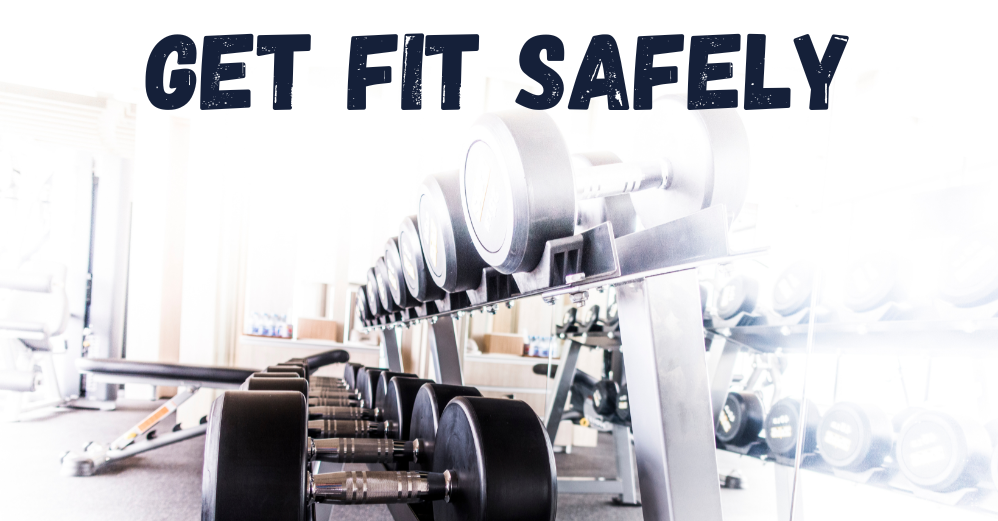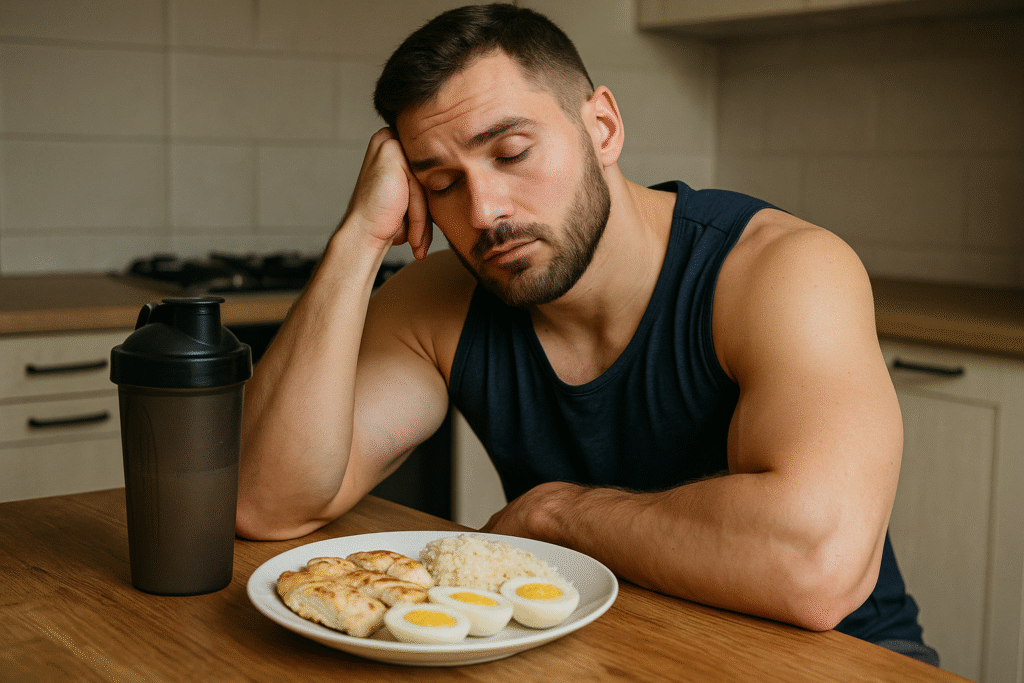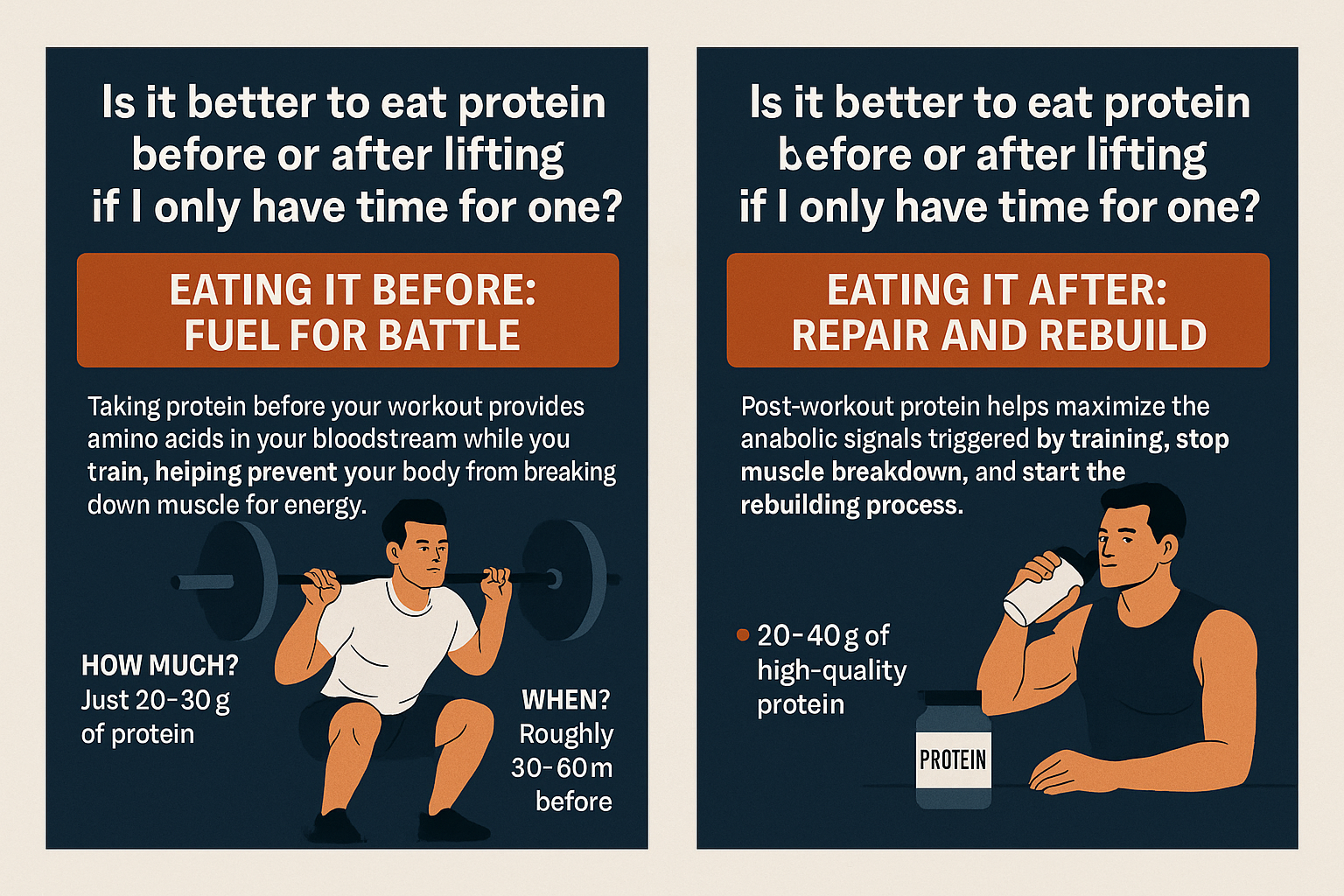Imagine the scene
You just finished a workout that made you feel like a beast.
You grab your shaker, devour some chicken breast, eggs, maybe even a bit of rice just to top it off.
You sit down, proud of yourself.
You wait for your body to start the magic of muscle growth.
And instead… you find yourself crashed on the couch like a cat after Christmas dinner.
Heavy eyes.
Zero desire to do anything other than snore.
And the question hits you: What the heck is going on?
Have I become allergic to protein?
Or… is it possible this post-meal drowsiness is actually sabotaging my muscle growth?
Let’s dig deep into this issue—like we go deep in a heavy squat.
The “steak coma” is real – and no, it’s not just you
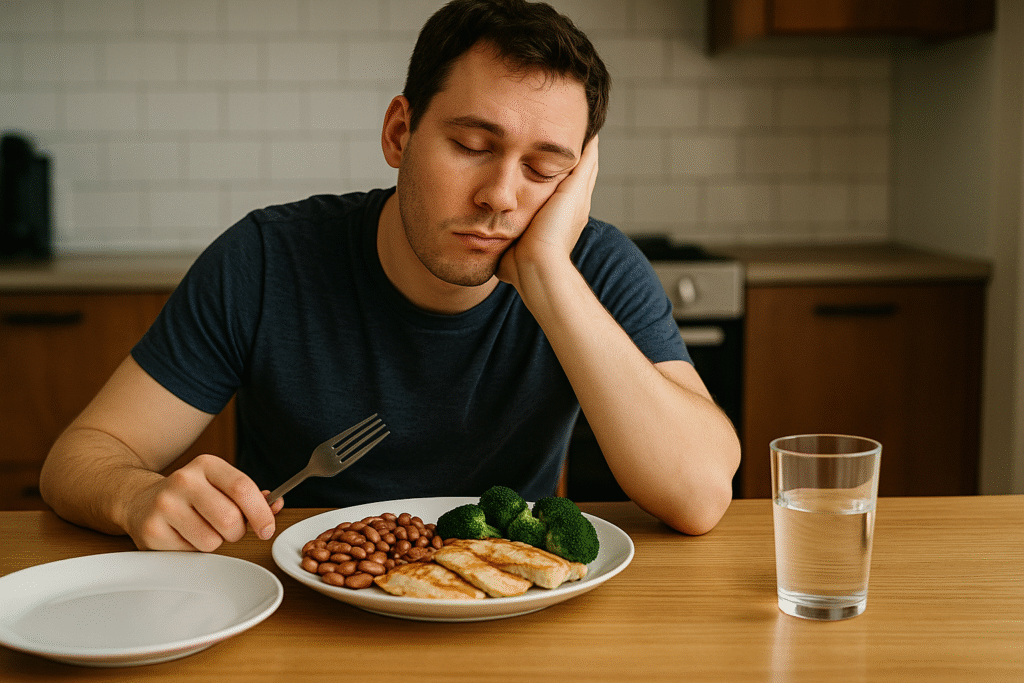
First of all, you’re not lazy, and you’re not getting old (at least not because of chicken).
Post-meal sleepiness—especially after a high-protein meal—is totally normal.
When you eat a generous amount of protein, especially from animal sources, your body has to work overtime to digest it.
Protein digestion demands more energy than carbs or fats.
This is called the Thermic Effect of Food (TEF).
For protein, TEF can be as high as 30% of the calories you consume.
So if you eat 100 calories of protein, your body might burn 20–30 just to process it.
Sounds great, right?
Yes, but… there’s a catch.
That digestive effort pulls a lot of blood and metabolic attention.
Your body shifts resources away from your brain and muscles and toward your digestive system.
The result?
You feel sluggish, foggy, and about as mentally sharp as a nightstand.
Basically, you’ve given your body fuel… but it’s using that fuel just to process itself, not to power you up.
The invisible culprit: tryptophan – the stealthy sleep ninja
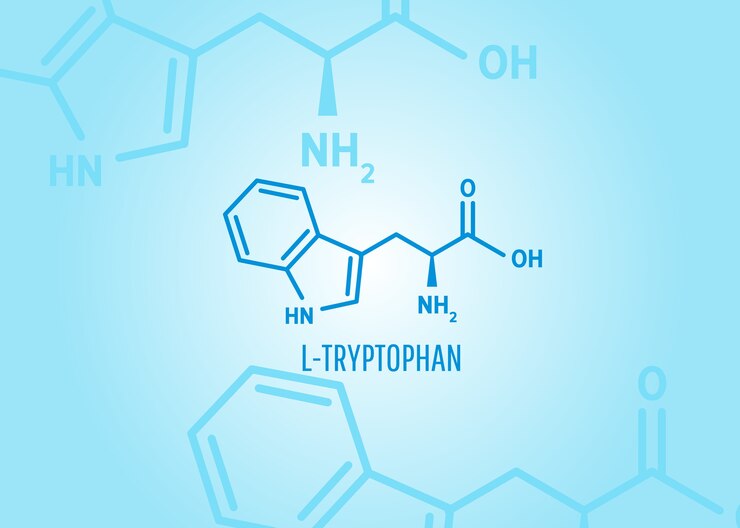
But wait, there’s more.
Many protein-rich foods (eggs, cheese, dairy, turkey…) are high in tryptophan, an essential amino acid.
So far, so good.
The issue?
Tryptophan is the precursor to serotonin, which then becomes melatonin.
Yes, that same melatonin you pop in pill form when you can’t sleep.
Now, under normal conditions, tryptophan competes with other amino acids to enter the brain.
But when your meal is unbalanced (too much protein, too few carbs), the competition drops—and tryptophan gets a free pass.
Translation: you’re basically micro-dosing yourself with a “natural sedative” every time you crush a protein-heavy meal.
But is this drowsiness ruining my gains?
It depends.
Here’s where it gets tricky.
Feeling a bit sleepy after eating isn’t harmful to muscle growth.
In fact, recovery and protein synthesis mainly happen at rest.
So if you crash for a nap after eating and wake up refreshed, you might actually benefit.
But if that drowsiness derails your plans…
If it keeps you from training, makes you skip your next meal, or leaves you wiped out for hours… then yeah, that’s a problem.
It means there’s an imbalance.
A strategic mistake in nutrient timing.
For example:
- If you eat too much protein at once, your body struggles to handle it
- If there are too few carbs, you’ll miss the insulin spike that helps drive protein synthesis
- If you skip fiber, digestion slows down in the wrong way—creating a “brick in the stomach” effect
Over time, all of this can make the muscle-building process less efficient.
You need a strategy: balance your plate, not just your macros
Personally, I solved this dilemma after months of yawning like a lion after a hunt.
I started spreading my protein intake throughout the day, instead of dumping it all into two giant meals.
I made peace with carbs—realizing they’re not the enemy, but protein’s best friends.
And I started respecting vegetables:
- More fiber = smoother digestion
- More micronutrients = less inflammation
- More satiety = fewer binges
The result?
More stable energy.
Fewer crashes.
And better performance—in the gym and beyond.
Because building muscle isn’t just about “eating a lot.”
It’s about eating smart, at the right time, with the right proportions.
Ever considered the problem might be… your gut?
Another issue too often ignored in the iron world: digestive health.
If every high-protein meal leaves you bloated, tired, with abs hard as concrete…
The issue might be digestive, not nutritional.
An inflamed gut doesn’t absorb nutrients properly.
And a sluggish gut slows everything—from digestion to motivation.
Sometimes, it might help to:
- Add digestive enzymes (like bromelain or papain)
- Use probiotics to rebalance your gut flora
- Rotate protein sources—not just chicken and whey, but also eggs, fish, tofu, legumes, tempeh…
Your stomach isn’t a dumpster.
It’s a chemical lab.
Treat it with respect, and it will reward you with results.
Watch the clock: when you eat matters as much as what you eat
Eating 40g of protein at 8 a.m. before a meeting or workout doesn’t hit the same as doing it at 8 p.m. post-training.
A heavy meal at the wrong time can ruin your afternoon.
Or make you skip an evening workout because of a food coma.
Learn to listen to yourself.
If you know some meals make you sleepy, use that effect to recover—not to wreck your day.
You might not need to change what you eat, but when and how.
What if the real issue is sleep quality—not chicken?
Hot take.
What if the problem isn’t lunch—but last night?
Because yes, if you sleep poorly or too little, even a perfectly balanced meal can knock you out.
Your body is desperately looking for recovery time… and as soon as it sees an opening (i.e. you sitting down to eat), it takes it.
Like a student napping between classes.
So if you keep passing out after meals, ask yourself:
- Do I sleep at least 7 hours a night?
- Do I wake up refreshed or already zonked?
- Do I bail on evening plans because I crash after 9 p.m.?
Maybe the food isn’t the issue.
Maybe your body is just saying: “Dude, give me a real night’s sleep, and then we’ll see if I still crash after chicken.”
How your body responds to high-protein meals long-term
Another underrated factor: adaptation.
Your body’s not dumb.
If you hammer it daily with 180–200g of protein in 2–3 giant meals, it eventually pushes back.
Digestion slows.
Your nervous system dulls.
Your gut gets inflamed.
And you feel more drained—even though you’re “doing everything right.”
The same stimulus, repeated endlessly, stops working.
Try cycling:
- High-protein days
- Higher-carb days
- Lighter meals here and there to give your liver and gut a break
Your body craves variety.
Not the 90s bodybuilder copy-paste routine.
Do protein powders make you less sleepy than solid food?
A fair question.
And the answer is—as always—it depends.
In general, protein powders digest faster than solid food.
A whey isolate, for example, gets absorbed in 20–30 minutes.
A chicken breast can take 2–3 hours.
And guess what?
Less time in digestion = less energy demand on your body.
The result?
Many people feel less sleepy after a shake than after a solid meal packed with meat, eggs, and cheese.
But here’s the catch:
Some people experience bloating, nausea, or stomach discomfort from protein powders—especially if:
- They’re lactose intolerant (and using whey concentrate)
- Sensitive to artificial sweeteners
- Using cheap blends filled with fillers and junk
In those cases, the body doesn’t just fail to digest properly…
It treats the shake like a threat.
Bloating causes inflammation, and inflammation leads to fatigue.
Yep. More of that dreaded sleepiness.
What can you do if that’s you?
- Try a lactose-free whey isolate
- Or switch to a plant-based protein (rice, pea), which some people digest better
- Avoid overloaded shakes (banana + peanut butter + whole milk + oats + whey = food brick)
- If you’re unsure, go 3–4 days without shakes and see how you feel
Sometimes, it’s all about quality and simplicity.
The cleaner the shake, the fewer the problems.
And fewer problems = less pointless fatigue.
What to eat if you want stable energy without skipping protein
You’re hungry.
You want gains.
But you also want to stay awake and functional—not morph into a human sofa.
Here are a few combos that support muscle growth without knocking you out:
- Eggs + veggies + whole grain bread
- Greek yogurt + berries + almonds
- Basmati rice + tuna + olive oil + lemon
- Stir-fried tofu + rice + cabbage
- Shake with isolate protein + oats + cinnamon
What do they all have in common?
- Not calorie bombs
- Balanced macros (not just protein!)
- Include fiber and healthy fats to stabilize blood sugar
- Avoid refined sugars or sleep-inducing combos
You don’t need to be a chef.
Just pay a bit of attention.
When post-meal sleepiness is a serious red flag
Let’s be real.
A little slump after lunch is fine.
But if every single meal turns you into a fainted sloth… something’s up.
It might be:
- Gut dysbiosis (messed up gut flora)
- Insulin resistance (especially if you overdo protein + saturated fat)
- Chronic sleep deprivation
- Burned-out adrenals from stress and high cortisol
In these cases, it’s not enough to just change your meat or meal timing.
You need a bigger-picture fix:
- Reduce stress (meditation, nature, breathing)
- Sleep better (magnesium, evening routine, no screens in bed)
- Get lab tests (insulin, blood sugar, cortisol, gut inflammation)
Bonus strategy: match your meals to your energy rhythm
It sounds basic—but it matters.
What you eat should match your natural energy flow.
If you’re alert in the morning, skip the bodybuilder feast on an empty stomach.
If you have work after lunch, don’t overeat.
If you train in the afternoon, save the heavy meals for then.
And at night?
Keep it light and soothing, so your sleep doesn’t suffer.
A few small changes, placed at the right time, beat a thousand supplements.
RELATED》》》 Can eating too many eggs every day mess with my cholesterol while bulking?
Conclusion
Post-protein sleepiness isn’t the enemy.
It’s a signal.
A clue.
A little bell telling you: “Hey, something needs optimizing.”
You don’t need to give up protein.
You just need to make peace with your body—and understand every effect has a cause.
Structure your meals better.
Balance your macros.
Respect your gut.
Tune in to your energy.
And above all: don’t chase muscle mass blindly.
Because real strength isn’t just what you lift.
It’s how good you feel while growing stronger.
And trust me—there’s nothing more powerful than a body that grows strong without crashing midday.

